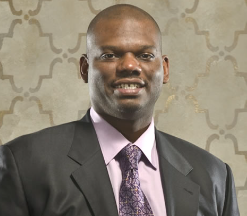By Lucas Shaw
Larry Jackson learned the record business from two of the most influential music moguls ever, Clive Davis and Jimmy Iovine. Now, the 42-year-old former Apple Inc. executive is starting a music company of his own called Gamma.

Jackson has about $1 billion in available capital, including equity and debt, according to people familiar with his finances. His biggest backer is Todd Boehly’s Eldridge, whose investments include the Los Angeles Dodgers, Bruce Springsteen’s music catalog and the film studio A24. Apple, where Jackson worked for the past eight years, has also invested, as has A24.
While he is loath to call Gamma a record label, Jackson is signing artists. He’s cut deals to release new music from Snoop Dogg, Usher and Rick Ross, and forged a joint venture with Snoop Dogg to distribute the catalog of the pioneering hip-hop label Death Row Records.
With such backing and talent, Jackson instantly becomes one of the most influential Black leaders in media, poised to join icons like Dr. Dre, Jay-Z and Sean Combs.
Jackson is pitching his company as an alternative to traditional record labels, which many artists feel have taken advantage of them. Gamma is promising artists more control over their work by agreeing to long-term licenses instead of ownership.
Gamma has acquired Vydia, a distribution company that releases millions of songs on new streaming services. That will allow Jackson to get his client’s music out there without a major label as a partner.
Gamma is also exploring outlets beyond music. The company is developing a slate of podcasts with the Shade Room, a media company with 28 million followers on Instagram. It’s also developing a couple movie ideas with A24.
“It made sense for two Black men to come together to change the face of the industry,” Snoop Dogg said in a phone interview from Australia. “I didn’t want to partner with a regular company because they respect me and fear me so much, they wouldn’t wanna give me ideas.”
Polo Lounge
Jackson uses the Polo Lounge at the Beverly Hills Hotel, a regular haunt for entertainment executives, as his de facto office when he’s in Los Angeles. He knows seemingly every staff member, from the maitre’d to the waiters.
He’s been coming to the restaurant since he was 19, a hungry and unproven executive working under Davis, the music impresario who steered the careers of Whitney Houston and Alicia Keys. Davis discovered Jackson when he was the music director at San Francisco radio station KMEL. Jackson spent so much time at the station that he was kicked out of high school for truancy.
Working for Davis, Jackson nurtured the career of British singer Leona Lewis, as well as contestants on the reality show American Idol , such as Kelly Clarkson, Jennifer Hudson and Ruben Studdard.
Jackson said Davis taught him “the science of what makes a hit. And, also, what makes the superstar. He’s really good at image and marketing.” Davis’s son Fred, one of the top financial advisers in the music business, helped Jackson raise money for Gamma.
When Jackson was fired from Sony Group over a disagreement with management, it turned out to be a good thing. He landed at Interscope working under Iovine, who had helped introduce hip-hop to mainstream culture with Eminem, Dr. Dre and 50 Cent.
By the time Jackson arrived at Interscope, Iovine was already plotting his next act. He had watched the internet minimize the power of record labels, and he saw opportunity in the new technology of streaming. Iovine and Dr. Dre started a headphones business and streaming music service. When Apple bought Beats for $3 billion in 2014, Iovine joined the company and brought Jackson with him.
“Larry has a very unique set of talents he’s obtained over the years,” Iovine said. “He comes from the creative side, he understands the tech side and he understands where they cross.”
It was Jackson who convinced some of the biggest artists in the world, including Drake, to release their songs on Apple Music before any other service. He then took it a step further, cutting out the record label and getting the exclusive rights to a new album from Frank Ocean. These deals turned Apple into the default music service for most hip-hop fans – as well as many Black consumers in the US.
Jackson is now using his deep relationships in the world of hip-hop and R&B for Gamma. When Snoop Dogg had a problem, Jackson was one of his first calls.
The rapper purchased Death Row Records last year, hoping to revitalize the label that released his debut album, Doggystyle. Snoop Dogg bought the label because he felt the business was being mismanaged and that he wasn’t being paid fairly for his contributions. He wasn’t getting any money for his songwriting on Dr. Dre’s The Chronic.
He started by yanking the music off major streaming services. But he wasn’t quite sure what to do next. Other artists, fans and streaming services reached out and pitched ideas. He thought about putting all the music back up, but not before Jackson offered to distribute Death Row’s catalog through his new company.
Jackson proposed a plan to make the music’s return to streaming feel relevant again. They started by releasing a few of the skits from the album as sounds on TikTok, the most important online service for music discovery. Those songs have since been used in millions of videos by fans. After a few weeks of building buzz, they are about to bring all the music back to streaming.
“Larry and Gamma came up with this,” Snoop Dogg said. “That’s why you want to partner with people who have things they can bring to the table and not be ‘yes men.’”
Gamma isn’t the first company to try and redefine the relationship between artist and record label. While many outsiders have sought to unseat major record companies, Universal Music Group, Sony and Warner Music Group remain the most powerful companies.
But Jackson enters the game with a big head start — support from one of the largest companies on earth, several major artists and enough capital to compete with the major labels in signing artists. Jackson has the pieces in place. Now he needs to execute.
More stories like this are available on bloomberg.com.




